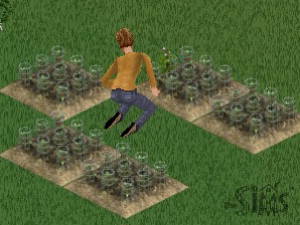Payday 11 October 2002

|
Pic of the day: So will we have to be so economical that we have to grow our own food again? (Screenshot from The Sims Unleashed, as I don't actually grow my own food, no. At least not yet...) Economic growth?Economic growth has been the rule for generations now. Except for a few wild-eyed leftists, few have opposed this development. After all, we all want to earn more. There is no obvious end to what we would like to have, and the only way for all to get more is economic growth. For more than a decade now, one of the worldís most advanced economies has been in a state of stagnation or slow recession. I talk about Japan. The full consequences of this have not manifested yet, as politicians as well as banks keep trying to hide the extent of the bad loans from the speculative boom in the 1980es. Hopefully other nations will be able to handle the end of their economic bubbles in a more rational way. But end they must. These days, it is the USAís turn. I wish my native Norway could burst its own bubble too; the stock market is falling, but because so much of our economy is centered on the state, and the state refuses to make visible its enormous pensions liabilities, the drunken revelry still goes on here. In the late 1990es, the US Federal reserve (or Fed for short) tried to arrange a "soft landing" for the American economy. This turned out to be impossible, because a crisis in the developing world ("Asia crisis", though it was at least as bad for Latin America and Russia) made it necessary for the USA to overheat its economy in order to pull the world out of recession. The price of this is just coming to light now. But what would the consequences be of a soft landing in the developed economies? The experience from Japan indicates that it is not such a disaster to slide sideways into the future. Admittedly they have not been willing to take the full losses yet, which would have given first a fall in economic output, followed by new growth. But an absence of growth is not necessarily such a catastrophe. If managed correctly, it could be quite tolerable. ***For instance, there are forms of growth that are not measured. When I buy a computer for $1000 today, it is not the same as a computer for $1000 five years ago, not to mention ten years ago. It is far more capable of entertainment and communication. It can do things we barely fantasized about ten years ago. But this is not counted as economic growth. If the same number of people buy the same number of computers at the same price, it is counted as stagnation in economic terms, and cause for great worry. I donít think so. I call this "sliding sideways into the future", and I believe it may become the norm for a while. (If we arenít all sucked into a black hole made by CERN in 2005 of course.) Other examples: If representatives of two companies started to travel to each otherís headquarters on the other side of the ocean, this was counted as economic growth. If they stop doing this and instead communicate over the far cheaper video conferencing, this is counted as economic backsliding. If sufficiently many people stopped making expensive business trips, we would be in a recession. The companies involved would save money, of course. But the airlines would lose money, and the people working there would lose their jobs. So unless the companies found other ways to waste their money, the recession would be real enough, with jobless people and all. I predict, however, that the money will find a way to get used. Money is a great escape artist. As my last example shows, it is not obvious that all economic activity is a good thing. It is easy to compare it to no economic activity, but perhaps our activity is of the wrong sort and could be replaced with a better one? Millions more people around the world may be able to work from home rather than spend a long time each day commuting. Others may be able to live and work in rural areas where property is much cheaper than in the cities. When people work their derriere off to pay for an expensive apartment on Manhattan, this is economic growth. If they could have a small house in the countryside and still only work normal hours, this would be a symptom of recession to classic economy. Much as I love economy, it is a dismal science when it comes to deciding happiness. It works quite nicely in developing countries, where economic growth translates into less starvation and more clean water. But in highly developed society, where economic growth translates into overtime and stress and broken families, I am not so sure. When a married couple divorces, and each has to work overtime to pay for their own separate home, this is economic growth. Is that really how we want to define reality? I am certainly not saying that we should lay off all economists or retrain them to sing "Hare Krishna Hare Rama Hare Hare" all day long. But we should keep in mind that earning more and more money is only half of progress. Once our bellies are full, we face the question of how to spend the rest of the money, and this is the good part. Perhaps if we start to slide sideways into the future, we will begin to devote more thought on this: How to maximize the happiness we get out of our spending. And this is a science yet not developed. |
A little rain. |
Yesterday <-- This month --> Tomorrow?